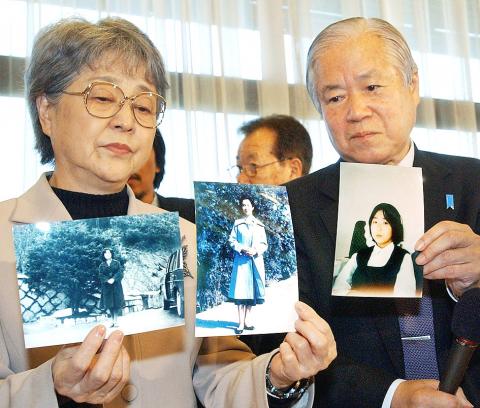Japan will send officials to North Korea while Pyongyang reinvestigates the fate of Japanese nationals it abducted in the Cold War years, a senior politician said yesterday.
Dispatch of the mission is part of an accord made last week by the the two countries, Japanese Chief Cabinet Secretary Yoshihide Suga said.
Japan and North Korea have no diplomatic ties and they contact each other through their embassies in Beijing at present.

Photo: AFP/JIJI PRESS
Since North Korea in 2008 agreed to reopen investigations but failed to keep its promise, Japan has been mulling ways to ensure an effective probe by the North.
“We strongly requested what had been missing in the previous 2008 accord — such as meeting people concerned and visiting relevant places while staying there — and it has been accepted,” Suga said in a program aired on public broadcaster NHK.
Kyodo News reported on Saturday that Japan was considering stationing diplomats and police officials in North Korea. Initially the officials would stay there for short periods, but Tokyo is considering making them resident officials and establishing a permanent office, the news agency said, quoting anonymous government sources.
The Japanese government said Thursday it would ease sanctions against North Korea if the secretive state delivers on a pledge to reinvestigate the cases of Japanese nationals kidnapped in the 1970s and 1980s to train spies.
The announcement, a major breakthrough in a very strained relationship, comes after three days of talks between the two sides in Sweden, and marks the most positive engagement between Pyongyang and the outside world in many months.
North Korea admitted in 2002 to having abducted 13 Japanese. However, it said without producing credible evidence that eight of them had died, provoking an uproar in Japan.
Tokyo has insisted that they are still alive and that there should be more kidnap victims from Japan.

Kehinde Sanni spends his days smoothing out dents and repainting scratched bumpers in a modest autobody shop in Lagos. He has never left Nigeria, yet he speaks glowingly of Burkina Faso military leader Ibrahim Traore. “Nigeria needs someone like Ibrahim Traore of Burkina Faso. He is doing well for his country,” Sanni said. His admiration is shaped by a steady stream of viral videos, memes and social media posts — many misleading or outright false — portraying Traore as a fearless reformer who defied Western powers and reclaimed his country’s dignity. The Burkinabe strongman swept into power following a coup in September 2022

‘FRAGMENTING’: British politics have for a long time been dominated by the Labor Party and the Tories, but polls suggest that Reform now poses a significant challenge Hard-right upstarts Reform UK snatched a parliamentary seat from British Prime Minister Keir Starmer’s Labor Party yesterday in local elections that dealt a blow to the UK’s two establishment parties. Reform, led by anti-immigrant firebrand Nigel Farage, won the by-election in Runcorn and Helsby in northwest England by just six votes, as it picked up gains in other localities, including one mayoralty. The group’s strong showing continues momentum it built up at last year’s general election and appears to confirm a trend that the UK is entering an era of multi-party politics. “For the movement, for the party it’s a very, very big

ENTERTAINMENT: Rio officials have a history of organizing massive concerts on Copacabana Beach, with Madonna’s show drawing about 1.6 million fans last year Lady Gaga on Saturday night gave a free concert in front of 2 million fans who poured onto Copacabana Beach in Rio de Janeiro for the biggest show of her career. “Tonight, we’re making history... Thank you for making history with me,” Lady Gaga told a screaming crowd. The Mother Monster, as she is known, started the show at about 10:10pm local time with her 2011 song Bloody Mary. Cries of joy rose from the tightly packed fans who sang and danced shoulder-to-shoulder on the vast stretch of sand. Concert organizers said 2.1 million people attended the show. Lady Gaga

SUPPORT: The Australian prime minister promised to back Kyiv against Russia’s invasion, saying: ‘That’s my government’s position. It was yesterday. It still is’ Left-leaning Australian Prime Minister Anthony Albanese yesterday basked in his landslide election win, promising a “disciplined, orderly” government to confront cost-of-living pain and tariff turmoil. People clapped as the 62-year-old and his fiancee, Jodie Haydon, who visited his old inner Sydney haunt, Cafe Italia, surrounded by a crowd of jostling photographers and journalists. Albanese’s Labor Party is on course to win at least 83 seats in the 150-member parliament, partial results showed. Opposition leader Peter Dutton’s conservative Liberal-National coalition had just 38 seats, and other parties 12. Another 17 seats were still in doubt. “We will be a disciplined, orderly